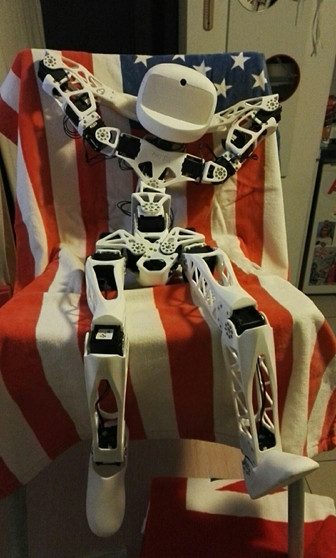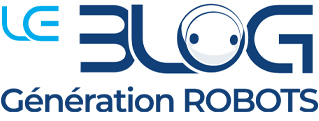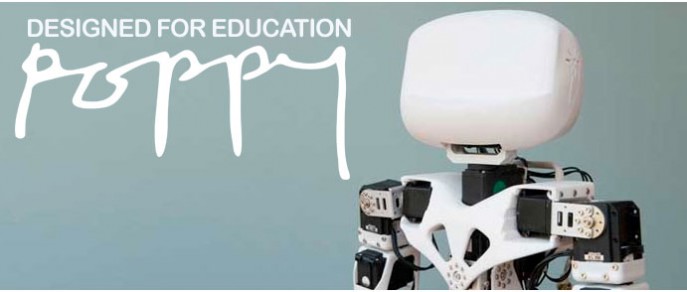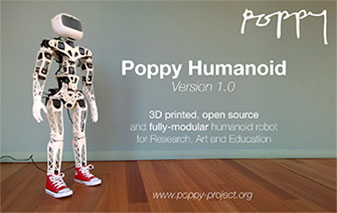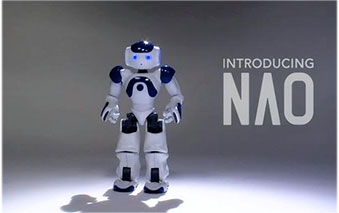Michel Wendling, teacher in science of engineering at the Tocqueville highschool (, Grasse, France) tried it and agreed to share with us (and you!) his first hand experience with the Poppy robot, a successful trial!
WHY POPPY ..?
How did you first hear about Poppy?
Following the reform of the baccalauréats in engineering sciences and in industrial and sustainable development science and technology in France, I began looking for a
humanoid robot
. A colleague wanted to buy the
NAO robot
, but the project wasn’t selected. So I started looking for a humanoid robot that would satisfy all our partners (our secondary school, the Polytech Nice Sophia engineering school and the schools inspectorate).
I’d never heard of it before then.
What finally made you decide to choose the Poppy platform rather than another?
The game changer was the fact that Poppy is an open-source robot that can be customised .
Poppy is an important investment for a secondary school. Are you happy with the advice and support our Génération Robots team provided when buying the robot?
Yes, I particularly appreciated your help with changing the control board and the overall support.
GETTING STARTED WITH POPPY..
Did you and your students find it easy getting started with Poppy?
Getting started was relatively easy because our students were keen to begin their project and we received lots of help from the Polytech Nice Sophia engineering students. We encountered some difficulties assembling the model because of the assembly tutorials, which are in the form of videos you have to watch from beginning to end and some are very long. There are also some tricky points that aren’t clearly explained, for example:
- The three notches on Poppy’s 3D parts matching the three zero marks on the servos could be much more visible; and
- the kit should also come with a much more practical hex screwdriver.
Do you work in small groups or with the whole class together? If you work in groups, how many people are there in a group?
We work with fifth form students and also sixth form students studying both science and industrial and sustainable development science and technology in groups of 10 to 20 , devoting about 20 hours to assembly , generally also using the simulator. We carry out the assembly work in smaller groups of two people .
Where did you find the course content for your practical work? Was it easy to find? What kind of documents and resources would you like to be able to find online?
The course content is largely dictated by the guidelines imposed for the baccalauréats in science and in industrial and sustainable development science and technology. On the Poppy website, I saw that the School of Moon contemporary dance company wanted to adapt an expressive head and articulated hand for their dance. I’m using the idea to make a percussionist Poppy with the Conservatoire de Grasse school of music.
How much time are you spending on assembly?
About 20 hours.

Are you using the simulator?
We’ve begun using it, but we won’t really use it properly until March.
Which classes do you think Poppy is most suitable for as an educational tool?
Personally, I use it for final year industrial and sustainable development science and technology students specialising in either eco-design and technological innovation or digital and information systems. It can also be adapted for engineering sciences .
POPPY AS COURSEWARE…
What concepts and subjects have you been able to teach using Poppy (3D printing, programming, mechanics, energy, engineering, etc.)?
There is a technological component because we adapt an expressive head, forearm and interchangeable wrist.
There is also an energy component because we check the motors in the elbow and wrist, which is a form of dynamic simulation.
There is also some programming , to enable Poppy to play like Les Tambours du Bronx.
Do you think Poppy is a comprehensive piece of courseware, allowing students to develop skills and expertise in for example analysis, teamwork and scientific thinking?
For the moment, Poppy has above all allowed us to harmonise the technological training provided by some of our teachers for our students.
What kind of projects have you and your students worked on with Poppy? What are your plans for the future?
We’re currently working on adapting an interchangeable forearm and motorised wrist. And we’re programming Poppy to become a percussionist.
In the future, we plan to put on a steel drum concert with the Grasse music school and Philippe Voituron and, if everything goes according to plan, we’ll be organising a concert with the Castafiore dance company for the next academic year.
Has Poppy helped you achieve your educational objectives?
This year’s objective was choosing a robot with a dozen or so students that would help a class of thirty pass their baccalauréat. We’ve achieved this with Poppy. By creating links with the music school, the students have also understood that their work can be used for other interesting purposes rather than being strictly limited to technical study.
GENERAL IMPRESSIONS…
Which three words best describe your experience with Poppy:
Linking: between all the people working with our secondary school’s technology department, including not only our teachers and the students themselves but also the office staff and Polytech Nice Sophia students.
Hands-on experience: our students have found a concrete means of completing their baccalauréat project, overcoming difficulties and persevering to finalise a viable solution for their diploma.
Pride: the students have been able to show and demonstrate their work at open-day events.
What else can we improve on the platform to make it more user-friendly and more appropriate for the school environment?
I’d be interested in a more rigorous and above all more succinct assembly tutorial.
Do you think your students have found Poppy more stimulating than the other teaching media (computers, electronics, etc.)?
Yes, because some came to work on their projects outside of school hours , notably to meet the deadline for the Polytech Nice Sophia open day.
Has Poppy inspired any of your students to take up a career in for example programming, engineering, robotics or design?
I don’t know if Poppy has inspired any career choices, but it has certainly made them want to complete a project they’re proud of .
